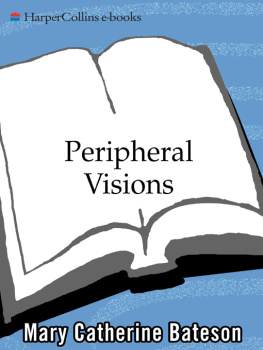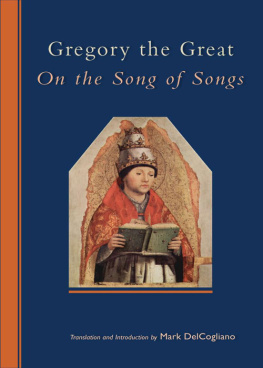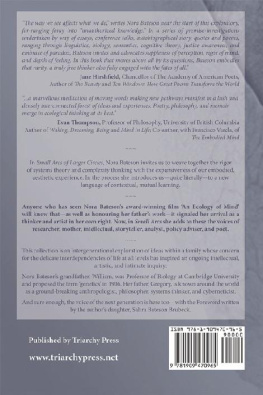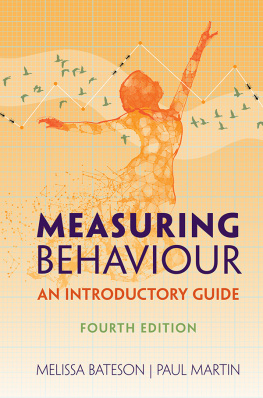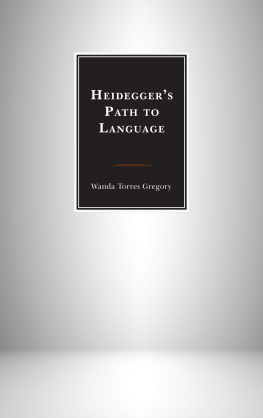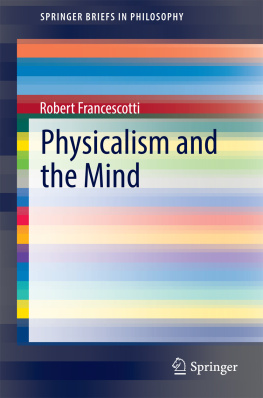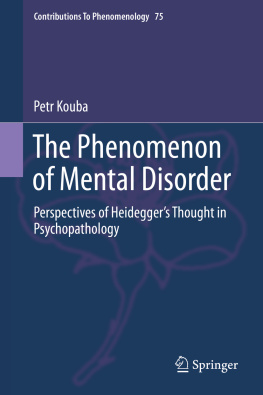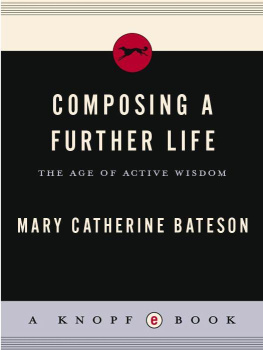All rights reserved. Originally published in USA as
1. Gregory Bateson between Epistemology and Ontologyp. 1
2. Systemic Diseases of Contemporary Sciencep.12
3. Birth of an Epistemological Matrixp.34
4. The Beautiful the Sacred, the Death. Towards a monisticp.50solution of Mind / Body Problem
5. Last Thoughtsp.76
6. Appendix. Gregory Batesons Notion of the Sacred.p.79Steps towards a Postmodern Determination of the
Essence of Religion.
All Bibles or sacred codes have been the causes of the following Errors:
1. That Man has two real existing principles: Viz: a Body & a Soul.
2. That Energy, calld Evil, is alone from the Body; & that Reason, calldGood, is alone from the Soul.
3. That God will torment Man in Eternity for following his Energies.
But the following Contraries to these are True:
1. Man has not Body distinct from his Soul; for that calld Body is a portionof Soul discernd by the five Senses, the chief inlets of Soul in this age.
2. Energy is the only life, and is from the Body; and Reason is the bound or outward circumference of Energy.
3. Energy is Eternal Delight.
WILLIAM BLAKE
, The Marriage of Heaven and Hell1GREGORY BATESON BETWEENEPISTEMOLOGY AND ONTOLOGY
In 1923, in a never read preface to a lecture course bearing the titleOntology: The Hermeneutics of Facticity, Martin Heidegger pointed to the taskwhich, from the point of view of his experience of thought, was moreproperly entrusted to the care of philosophical meditation, by the followingwords:
"Asking questions. Questions are not flashes of genius, questions are noteven the problems today so regular which you fish in hearsay and find inthe readings and which are accompanied by a gesture of deepness.Questions arise from confrontation with things. And things are only therewhereeyesare."
With this statement put almost at the onset of his speculative journeyHeidegger definitively repudiated the later insurgent attempts to present hiswork as overly divorced from the real problem context of modern man,when not simply ideological, and at the same time spelled out the need for ageneral ontic curvature for every thought that aspired to be seriously andradically hanging from a fundamental ontological question.
From the point of view of this statement, the mans thinking wasconfigured essentially as an activity inextricably linked to the truth of histhrownness (Geworfenheit) into the world, even as the eminent space of therevealing of this thrownness as a historical thrownness. What else did theduty of the confrontation with the things declare unless the bond oforigin and reference of the philosophical application with the reasons of itsown time and with the ontic issues which this time calls into question? Inthe specific case of Heideggers experience the insertion of the fundamentalontological question (Seinsfrage) in the most advanced consciousness of hisown time and in his knotty problem was realized in the identification of thequestion concerning technology as an intimation always and even moretoday put to thinking of Being.
Referring to that experience of thought and to its initial quotedstatement as to the inspiring intention of the present work, we ask: what istoday - in an era that is only partially also Heideggers the thing bycomparing with the philosophical interrogation should arise?
Of course it is not a matter to give the reflection a theme or a titleand then hold it in terms of an easy and charming relevance. Instead, it isto become aware of the fact that the authenticity of all our possiblearrangement to ask and to think currently resides in our ability to remain inthe vicinity of the event whose happening originally essentializes our time.
The event is the eradication of man from the earth by a technique whichin its disturbing and effective operating increases so rapidly itsoverwhelming power to tend now to achieve a dimension of globaldomination and the fulfillment of all its chances of provocation andmachinations of the being.
Directed to this event - that happens today and has been for threecenturies on the way 1- attention and willing to investigate shared by allfields of knowledge and common to all civilizations and cultural traditionshave arisen from time. The measure of this new attention is itself a sign ofthe pressure that contemporary thought receives from its thing.
The historical phenomena in the background of which our practice withthe world takes character and visibility in all aspects and moments are, bynature and size, that the thought is not allowed to reject or to neglect apayment.
Felix Guattari wrote that the great crisis of the end of the millenniumseems to announce as the conjunction of all possible convulsions 2andthat you would not end to enumerate the fields drifting, or which evolve ina catastrophic way (energy, employment , ecology, demography,international relations ...)3. We all adhere - in a more or less conscious way
to this perception of reality. We seem to share the generalized anxiety ofthose who are in the imminence of the deconstruction of all the axioms oftheir personal functioning. This feeling echoes indeed at the center of ourlives as the fundamental emotional tonality of present age.
1MARTIN HEIDEGGER,
Nur noch ein Gott kann uns helfen(Der Spiegel, May31, 1976)
The historical evolution of our communities on a global scale (which like any other evolutionary process - should always act in a delicate balanceof innovation and stability) hangs conspicuously on the side of theinnovative elements and accelerates so violently its bike to let us predict therapid achievement of a kind of vanishing point and the resulting finalseparation from anchorage to any kind of tradition. That link oftransmission and essential derivation that has always linked the present tothe past and has allowed its intelligibility at the thought is progressivelyvanishing.
Our sense of belonging to the world is shaken to its roots, the humanityof man is subjected to a deep process of obsolescence, and the conditionsfor the survival of the biosphere itself is at risk of being compromisedbeyond repair. Still, the thought still shows mainly to correspond only interms of increasing agitation and of a didactic unproductive anxiety, whichdoes not commit its most intimate resources, does not push it forward inunderstanding but rather condemns it to confine itself among showy andsuperficial aspects of the thing in question. We are unable to access thatinitial appeal that the radical nature of the events taking place insteaddemands from meditation.
Above all, we find it hard to establish as a leader of the acquiredreflection the awareness that the transformations of our time cannot begrabbed and correctly localized in the space of a merely accidental andhistorical phenomenology. Namely, the awareness that those
2FELIX GUATTARI,
Soft Subversions(Semiotextet, 1996), chapter 19,
Plan forthe planettransformations require instead of being considered as in some way fatedoutcomes of the epistemological premises of our civilization, and thattherefore these premises have to be taken as the true reference ofphilosophical inquiry.


